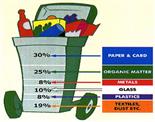
Over 50% of the waste in our rubbish bins can be recycled yet:
- 74% of waste goes to landfill. Where the materials breakdown under anaerobic conditions to produce methane and other greenhouse gases. Chemicals and pollutants are also leaked in to ground water causing environmental damage and creating a hazard to human health
- 18% of waste is recycled. Recycling helps to save energy and virgin resources from exploitation
- 8% of waste is incinerated also known as energy from waste. This produces pollutants however under correct management these can be minimised and are often less hazardous than sending the material to landfill
Why Recycle?
We all produce household waste, and most of this is buried in landfill sites (large areas of land that are dug up, filled with rubbish and covered over again). Not only does this look ugly but sites are becoming harder to find as we are rapidly running out of space. We throw away approximately 435 million tonnes of rubbish every year and about half of this could be recycled.
Never before has recycling been so important, new legislation and investment by industry and local authorities mean that we must learn to recycle more of our household waste.
We cannot stop the production of waste, but we can reduce its impact on our environment, protecting the countryside for the future.
Most of what we put in the rubbish bin is made from products that are slowly running out, but, by recycling we can save our resources, save energy, save space and create jobs by supporting new industries.